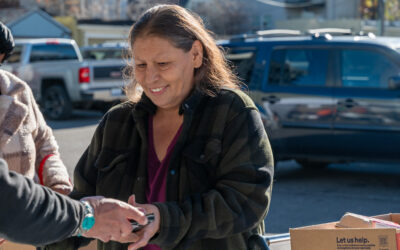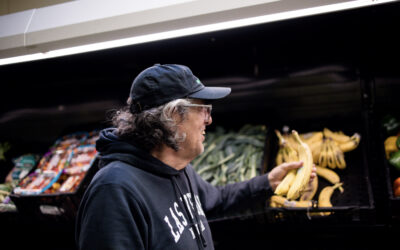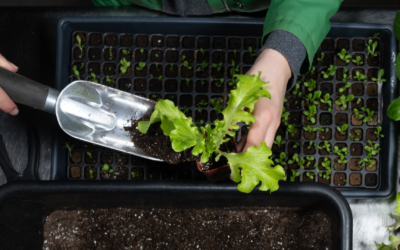This summer, students from Girls Inc. of Metro Denver interned with Metro Caring’s Food Access program to explore the connection between our culturally rooted food purchases and the health benefits of consuming local produce.
Joy and Karinne, two rising seniors from Smoky Hill High School, worked with Food Access Manager Cory Scrivner and nutrition intern Ashley Pratt-Cordova from Priority Nutrition Care on a research and educational project that focused on how food can be medicine.
Joy and Karinne worked together to identify a handful of foods that offer strong nutritional benefits that Metro Caring can prioritize stocking in the Fresh Foods Market. They examined local farms to identify where the food could be purchased and developed a growth calendar to help pinpoint when items would be available. Specifically, they researched the plants and herbs that Common Name Farm, Ekar Farm, and Spirit of the Sun grow.
Karinne explains she and Joy focused on partnerships with Black, Indigenous, and People of Color-owned and operated farms.
Latine, Black, and Native American communities experience poverty at twice the rate of non-Latine white communities, according to a U.S. Census Bureau report. In Metro Caring’s mission to end hunger at its root, we hope investing in BIPOC farmers serves as a small step toward closing this gap.
The intern duo also designed educational cards for the Fresh Foods Market to share nutritional aspects of specific foods, such as one they created for tomatoes. They included the cultural background and origin of the foods, the vitamins and their benefits to the body, and suggestions for different ways to prepare it.
Joy hopes her and Karinne’s work will help the Metro Caring Food Access team and the community.
“It could help the nutritional aspect of how a person is going to shop and eat in the market,” she says. “In the warehouse, it helps with incoming food and growing projects.”
As global diet-related diseases rise, healthcare providers and nutritionists are approaching food as a form of medicine. One example is using medically tailored meals that are prepared to meet the dietary needs of patients with chronic diseases. For example, meals could focus on low-sodium foods for someone with heart disease or low-carb foods for diabetes patients.
“Medicine isn’t the only solution,” says Karinne, whose career goal is to be a pediatrician. “It’s also about healthy eating. Learning about all the nutritional benefits of different foods was very interesting.”
Metro Caring’s Senior Manager of Food Sovereignty, Neambe Leadon, says that food has long been valued for its medicinal properties. Certain herbs and oils were, and still are, used in place of pharmaceuticals in cultures around the world. She says bitter melon, for example, helps regulate blood sugar levels, a possible superfood for diabetics.
Yet U.S. healthcare and insurance have not historically supported people in eating healthy diets as a solution to sickness and disease. Recently, however, the Biden administration started allowing Medicaid funding to be spent on groceries and nutritional counseling to explore whether food as medicine programs can lead to broad health benefits and lower costs.
Neambe says that people have to make choices about their diet based on their ability to access food. In smaller communities, food choices may be limited to fast food chains and gas station markets. Even when grocery stores are available, not everyone has the money to purchase the items they need, Neambe says.
“I’ve heard people say that ‘food is food,’ that some food is better than nothing,” Neambe says. “But that’s not true. It’s not right for us to give people who can’t afford food junk food. Children can’t build a healthy body and brain from soda and discontinued pop tart flavors.”
In Denver, people who experience food insecurity are three times more likely to report poor or fair general health. For example, food-insecure households experience higher rates of diabetes, a life-threatening disease that affects more than 37 million Americans.
Treatment for diabetes includes a combination of medication and self-management of healthy lifestyle habits, such as diet and exercise to help regulate blood sugar. However, many patients don’t have access to resources or support to maintain a healthy lifestyle. In fact, almost half of type-2 diabetics are unable to achieve adequate glycemic control.
These challenges are further divided along racial lines. Black households are three times more likely to experience food insecurity while Latine households are twice as likely to experience food insecurity compared to white households.
As Food Access Manager, Cory believes her team’s work is important for expanding access to healthy and culturally relevant items, especially for historically marginalized communities.
“With the current systems in place, the unfortunate reality is that impoverished folks end up with unwanted and discontinued junk food items,” Cory says. “In the Fresh Foods Market, my team aims to create a dignified space of choice and prioritize providing our community with options that will contribute to their health and well-being. I feel so honored to be in this position, at an organization that values the health and long-term prosperity of their community.”
As she and her team work to identify better models to procure food for the market, Joy and Karinne’s efforts helped move the needle.
“I’m so grateful for Joy and Karinne’s work to help us more systematically identify and procure healthy items to keep on our shelves for the community,” Cory says. “Working with our next generation of leaders on important issues like health equity is truly what it will take to end hunger at its root.”
Joy and Karinne say their internship taught them about managing their time and self-discipline in getting their work done. The part they enjoyed the most? Collaborating with each other and the Metro Caring team.




